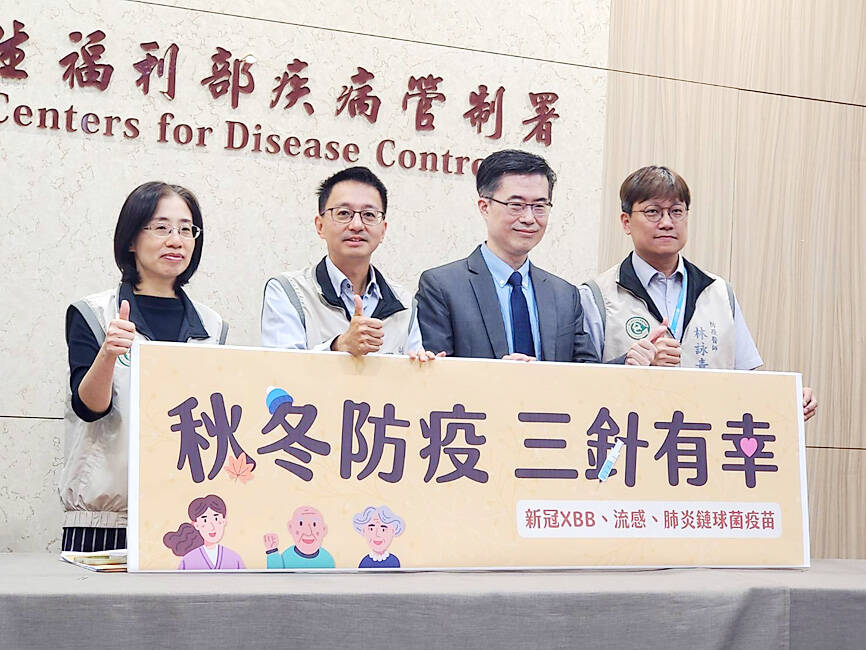The Centers for Disease Control (CDC) yesterday said that a surge in respiratory illnesses in China has been caused by at least seven types of pathogens, and small children, elderly people and immunocompromised people should temporarily avoid unnecessary visits to China.
The recent outbreak of respiratory illnesses in China is mainly in the north and among children, CDC Deputy Director-General Philip Lo (羅一鈞) said on Monday.
Data released by the Chinese National Health Commission on Sunday showed that among children aged one to four, the main pathogens were influenza viruses and rhinoviruses, while among children aged five to 14, the main pathogens were flu viruses, Mycoplasma pneumoniae bacteria and adenoviruses, Lo said.

Photo: Lin Hui-chin, Taipei Times
It also showed that among people aged 15 to 59, the main pathogens were flu viruses, rhinoviruses and SARS-CoV-2 (the virus that causes COVID-19), while among people aged 60 or older, the main pathogens were flu viruses, human metapneumoviruses and coronaviruses, he said.
“As temperatures continue to drop, respiratory illnesses in China are expected to continue to increase. The CDC will closely monitor the surge and data released by China to draft disease prevention measures for the Lunar New Year holiday,” Lo said.
As the surge has put a strain on healthcare services in China and making an outpatient appointments could be more difficult, the CDC recommends that young children, elderly people and those with compromised immune systems avoid unnecessary travel to China, Lo said.
If they must visit China, the CDC suggests that they get flu and COVID-19 vaccines before traveling, maintain proper hygiene, wear a mask and wash their hands frequently, he added.
Asked if the surge in China has affected Taiwan, Lo said the weekly reported numbers for flu-like illnesses in Taiwan have dropped for seven consecutive weeks.
Of the identified respiratory viruses in Taiwan in the past four weeks, the most common were flu viruses (32 percent), followed by adenoviruses (26 percent) and parainfluenza viruses (14 percent), he said.
Mycoplasma pneumoniae, which people are worried about, is not a virus, and data from a medical center shows that it accounted for less than 1 percent of the respiratory illnesses identified at hospital, he said.
However, Mycoplasma pneumoniae infection usually causes milder symptoms than the flu, so people might visit clinics for treatment, he said, adding that, in general, an upsurge in respiratory illnesses has not been observed in Taiwan.

Alain Robert, known as the "French Spider-Man," praised Alex Honnold as exceptionally well-prepared after the US climber completed a free solo ascent of Taipei 101 yesterday. Robert said Honnold's ascent of the 508m-tall skyscraper in just more than one-and-a-half hours without using safety ropes or equipment was a remarkable achievement. "This is my life," he said in an interview conducted in French, adding that he liked the feeling of being "on the edge of danger." The 63-year-old Frenchman climbed Taipei 101 using ropes in December 2004, taking about four hours to reach the top. On a one-to-10 scale of difficulty, Robert said Taipei 101

Nipah virus infection is to be officially listed as a category 5 notifiable infectious disease in Taiwan in March, while clinical treatment guidelines are being formulated, the Centers for Disease Control (CDC) said yesterday. With Nipah infections being reported in other countries and considering its relatively high fatality rate, the centers on Jan. 16 announced that it would be listed as a notifiable infectious disease to bolster the nation’s systematic early warning system and increase public awareness, the CDC said. Bangladesh reported four fatal cases last year in separate districts, with three linked to raw date palm sap consumption, CDC Epidemic Intelligence

Two Taiwanese prosecutors were questioned by Chinese security personnel at their hotel during a trip to China’s Henan Province this month, the Mainland Affairs Council (MAC) said yesterday. The officers had personal information on the prosecutors, including “when they were assigned to their posts, their work locations and job titles,” MAC Deputy Minister and spokesman Liang Wen-chieh (梁文傑) said. On top of asking about their agencies and positions, the officers also questioned the prosecutors about the Cross-Strait Joint Crime-Fighting and Judicial Mutual Assistance Agreement, a pact that serves as the framework for Taiwan-China cooperation on combating crime and providing judicial assistance, Liang

US climber Alex Honnold left Taiwan this morning a day after completing a free-solo ascent of Taipei 101, a feat that drew cheers from onlookers and gained widespread international attention. Honnold yesterday scaled the 101-story skyscraper without a rope or safety harness. The climb — the highest urban free-solo ascent ever attempted — took just more than 90 minutes and was streamed live on Netflix. It was covered by major international news outlets including CNN, the New York Times, the Guardian and the Wall Street Journal. As Honnold prepared to leave Taiwan today, he attracted a crowd when he and his wife, Sanni,